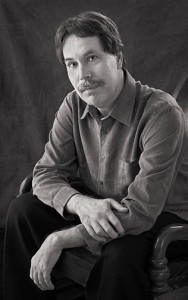
Finding solace where he can.
I met writer Okla Elliott online – well, on Facebook, to be precise.
I’m regularly daunted by his output, which he posts about regularly: His work has appeared in Harvard Review, The Hill, Huffington Post, Indiana Review, The Literary Review, New Letters, Prairie Schooner, and he had a “notable essay” in Best American Essays 2015. His books include From the Crooked Timber (short fiction), The Cartographer’s Ink (poetry), The Doors You Mark Are Your Own (a coauthored novel), Blackbirds in September: Selected Shorter Poems of Jürgen Becker (translation), Bernie Sanders: The Essential Guide (nonfiction). The last book has gotten a lot of attention this year, for obvious reasons. Oh yes, and he’s currently working on Pope Francis: The Essential Guide (nonfiction, forthcoming), from an unusual p.o.v.: “I’m probably technically an agnostic, but I am a kind of Tolstoyan/Buddhist/existentialist/leftist-Catholic agnostic, so a theological and philosophical mutt.”
Then, suddenly, his intimidating output briefly plummeted to zero. He fell ill. … like, really near-death ill. A few weeks ago, he was hospitalized for a mysterious illness that turned out to be “diabetic acidosis.”
 Nevertheless, he took some unusual medicine. He turned to Gregorian chant. As he explained in his Facebook status: “I listen to the monks of the Abbey of Notre Dame singing in Latin every night for an hour before I go to sleep. It’s oblique immersion research for my pope book; it’s relaxing and enchanting; and it’s just really pleasant. I recommend it highly. I kinda zone out and/or kinda meditate and/or think about random crap, letting my mind float wherever it will. Anyway…this is a pointless status, as are so many, but there you have it…Oh, and it’s streaming on Amazon Prime, so you can listen for free, if you have interest.” It’s on Amazon Prime here.
Nevertheless, he took some unusual medicine. He turned to Gregorian chant. As he explained in his Facebook status: “I listen to the monks of the Abbey of Notre Dame singing in Latin every night for an hour before I go to sleep. It’s oblique immersion research for my pope book; it’s relaxing and enchanting; and it’s just really pleasant. I recommend it highly. I kinda zone out and/or kinda meditate and/or think about random crap, letting my mind float wherever it will. Anyway…this is a pointless status, as are so many, but there you have it…Oh, and it’s streaming on Amazon Prime, so you can listen for free, if you have interest.” It’s on Amazon Prime here.
“Although practitioners of Gregorian chant have rarely emphasized the healing properties of their music, the positive physiological benefits of chanting become all to evident when monks are deprived of it. At a Benedictine monastery in the south of France, chanting was curtailed in the mid-1960s as part of the modernization efforts associated with the Second Vatican Council. The results could not have been more disastrous. The monks had previously been able to thrive on only four hours of sleep per night, provided they were allowed to chant. Now they found themselves listless and exhausted, easily irritated, and susceptible to disease.

He got better. Whew!
“Several doctors were called in, but none was able to alleviate the distress of the monastic community. Relief came finally, but only when Alfred Tomatis convinced the abbot to reinstate chanting. As he recalled: ‘I was called in by the Abbott in February, and I found that 70 of the 90 monks were slumping in their cells like wet dishrags. … I reintroduced chanting immediately. By November, almost all of them had gone back to their normal activities, that is their prayer, their few hours of sleep, and the legendary Benedictine work schedule.’

Thanks, Ted!
“The decisive factor, it seems, had been a simple matter of sound. Similar examples can be found in other chanting traditions. Romano Mastromattei, in his study of shamanism in Nepal, recalls observing for two consecutive days a healer ‘who attained a considerably altered state of consciousness merely by chanting mantras.’ The sacred literature of Tibet offers many stories of extraordinary feats of endurance attributed to holy practitioners, and though these are usually assigned a spiritual origin, it seems worth noting that Tibetan chanting is increasingly being employed for therapeutic purposes …”
Okla got better. “Friends always make fun of me for being able to find positive in just about anything,” he posted on Facebook. He needed to find the bright spots where he could. His apartment was broken into during his hospitalization and his computer stolen.

 Nevertheless, he took some unusual medicine. He turned to Gregorian chant. As he explained in his Facebook status: “I listen to the monks of the Abbey of Notre Dame singing in Latin every night for an hour before I go to sleep. It’s oblique immersion research for my pope book; it’s relaxing and enchanting; and it’s just really pleasant. I recommend it highly. I kinda zone out and/or kinda meditate and/or think about random crap, letting my mind float wherever it will. Anyway…this is a pointless status, as are so many, but there you have it…Oh, and it’s streaming on Amazon Prime, so you can listen for free, if you have interest.” It’s on Amazon Prime here.
Nevertheless, he took some unusual medicine. He turned to Gregorian chant. As he explained in his Facebook status: “I listen to the monks of the Abbey of Notre Dame singing in Latin every night for an hour before I go to sleep. It’s oblique immersion research for my pope book; it’s relaxing and enchanting; and it’s just really pleasant. I recommend it highly. I kinda zone out and/or kinda meditate and/or think about random crap, letting my mind float wherever it will. Anyway…this is a pointless status, as are so many, but there you have it…Oh, and it’s streaming on Amazon Prime, so you can listen for free, if you have interest.” It’s on Amazon Prime here.



